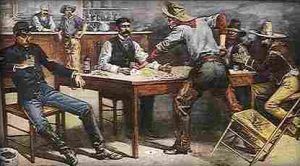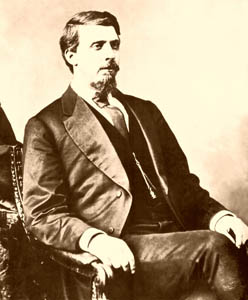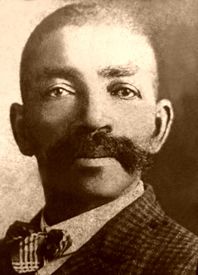Robert “Bob” Dozier was a farmer-turned outlaw accused of multiple crimes in Indian Territory before famed U.S. Deputy Marshal Bass Reeves tracked him down.
Before turning to a life of crime, Bob Dozier was a prosperous farmer. Unlike most Oklahoma outlaws of the time, Dozier was not forced by “need” to take up thievery but evidently “chose” the lifestyle, perhaps for adventure, perhaps for greed – no one really knows.
What is known is that once he took up the life of crime, he was as successful at that as he had been at farming.
Described as skillful, clever, and vicious, Dozier was a “jack-of-all-trades,” involved in a wide variety of crimes that made him a tough man to apprehend. His varied misdeeds included thievery of every imaginable kind, including cattle rustling, robbing stores, and banks, holding up stagecoaches, and taking the last bit of cash from lonely riders on the trail. He was also the leader of a horse-stealing ring, acted as a fence for stolen jewels, and was involved in several land swindles. In some cases, he was said to have been known to torture and even kill persons from whom he wished to obtain information.
For years, Dozier had been pursued by various lawmen, some of whom were U.S. Deputy Marshals working under Judge Isaac Parker’s iron hand, who presided over the United States District Court in Fort Smith, Arkansas. At that time, this was the only Federal court with jurisdiction over the lawless Indian Territory that had been overrun with cattle and horse thieves, whiskey peddlers, and bandits seeking refuge in the untamed territory was free of a “White Man’s Court” until 1875.
By 1878, the clever outlaw, who openly scoffed at law enforcement, including the U.S. Marshals and Judge Parker, was actively being trailed by none other than famed U.S. Deputy Bass Reeves. Eventually, Dozier learned that Reeves was following him and sent word to the lawman that he would kill him if he didn’t stop hunting him. But Reeves was undaunted and soon got his own message back to Dozier, stating that the outlaw would have to stop running, and when he did, Bass was ready to give him the chance. No further messages were exchanged as Dozier continued to run and Reeves continued to follow him.
After tracking the outlaw for several months, Reeves finally had tips that led him to the Cherokee Nation in present-day Oklahoma.
On December 20, 1878, Bass and only one posseman knew they were getting close as they rode deeper and deeper into the Cherokee Hills. That night, a storm erupted the two lawmen began looking for a dry place to camp for the night. As they were close to finding a good spot, they heard the sound of a gunshot at about the same time as a bullet whizzed by Reeves’ head. The two lawmen immediately ran for cover, expecting more gunshots to follow, but heard only silence.
Then Reeves saw a shadow moving through the trees and fired twice. The gunfire was quickly returned, at which point the lawman dove for cover.
On the ground, Bass spied his attacker in the trees. It was Dozier who was laughing loudly, believing he’d gotten his man. Suddenly, Bass jumped up and ordered Dozier to drop his gun. The outlaw dropped quickly into a crouch, bringing up his rifle. But, Reeves was ready with the trigger and shot the outlaw in the neck, killing him instantly.
According to his daughter Alice Reeves Spahn, Bass Reeves felt the high point of his career was bringing justice to one Bob Dozier.
©Kathy Weiser-Alexander, updated December 2020.
Also See:
Bass Reeves – Black Hero Marshal
U.S. Marshals – Two Centuries of Bravery
Sources:
American Handgunner
Burton, Art T.; Black Gun, Silver Star: The Life and Legend of Frontier Marshal Bass Reeves; Bison Books, 2008
The Tombstone News



